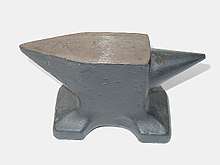anvil
English

Etymology
From Middle English anfilt, anvelt, anfelt, from late Old English anfilt, anfilte, anfealt, from earlier onfilti (“anvil”), from Proto-Germanic *anafeltaz (compare Middle Dutch anvilte, Low German Anfilts, Anefilt, Old High German anafalz), compound of *ana (“on”) + *feltaz (“beaten”) (compare German falzen (“to groove, fold, welt”), Swedish dialectal filta (“to beat”)), from Proto-Indo-European *pelh₂-t- (“shaken, beaten”) (compare Old Irish lethar (“leather”), Latin pellō (“to beat, strike”), Ancient Greek πάλλω (pállō, “to toss, brandish”)), enlargement of Proto-Indo-European *pelh₂- (“to stir, move”). More at felon.
Noun
anvil (plural anvils)
- A heavy iron block used in the blacksmithing trade as a surface upon which metal can be struck and shaped.
- 1594, Christopher Marlowe, Edward II, Act I, Scene 4,
- My heart is as an anvil unto sorrow,
- Which beats upon it like the Cyclops’ hammers […]
- c. 1596, William Shakespeare, King John, Act IV, Scene 2,
- I saw a smith stand with his hammer, thus,
- The whilst his iron did on the anvil cool,
- With open mouth swallowing a tailor’s news […]
- 1794, William Blake, “The Tyger,” lines 15-16,
- What the anvil? what dread grasp / Dare its deadly terrors clasp?
- 1840, Henry Wadsworth Longfellow, “The Village Blacksmith” in Ballads and Other Poems, Cambridge, Mass.: John Owens, 2nd edition, 1842, p. 102,
- Thus at the flaming forge of life
- Our fortunes must be wrought;
- Thus on its sounding anvil shaped
- Each burning deed and thought!
- 1875–1876, Gerard Manley Hopkins, “The Wreck of the Deutschland”, in Robert Bridges, editor, Poems of Gerard Manley Hopkins: Now First Published […], London: Humphrey Milford, published 1918, OCLC 5093462, part 1, stanza 10, page 14:
- With an anvil-ding / And with fire in him forge thy will / Or rather, rather then, stealing as Spring / Through him, melt him but master him still: […]
- 1594, Christopher Marlowe, Edward II, Act I, Scene 4,
- (anatomy) An incus bone in the middle ear.
- A stone or other hard surface used by a bird for breaking the shells of snails.
- This term needs a definition. Please help out and add a definition, then remove the text
{{rfdef}}. Part of a micrometer.
Translations
|
|
|
|
Verb
anvil (third-person singular simple present anvils, present participle anvilling, simple past and past participle anvilled)
- To fashion on an anvil (often used figuratively).
- 1648, Abraham Cowley, The Foure Ages of England, or, The Iron Age with Other Select Poems, London, Postscript,
- I Have anvil’d out this Iron Age,
- Which I commit, not to your patronage,
- But skill and Art […]
- 1671, John Ogilby (translator), Atlas Chinensis, London, “A Third Embassy to the Emperor of China and East-Tartary,” p. 291,
- The Family Tang caus’d an Iron Pillar to be erected there of three Rods high, and of a proportionable thickness, Anvil’d out of an intire Piece.
- 1748, Samuel Richardson, Clarissa, London, Volume 7, Letter 92, p. 341,
- I never started a roguery, that did not come out of thy forge in a manner ready anvilled and hammered for execution […]
- 1648, Abraham Cowley, The Foure Ages of England, or, The Iron Age with Other Select Poems, London, Postscript,